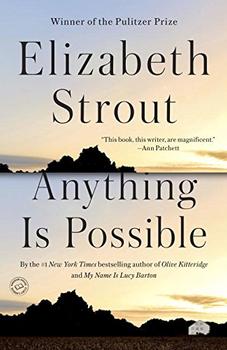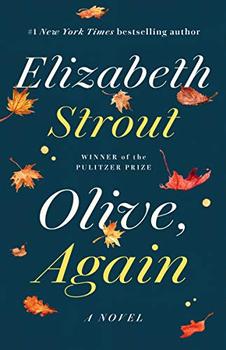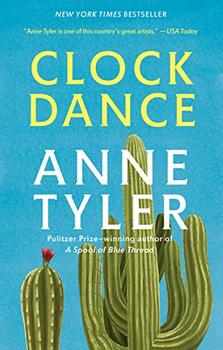Summary | Excerpt | Reading Guide | Reviews | Beyond the book | Read-Alikes | Genres & Themes | Author Bio

Amgash Series #2
by Elizabeth StroutIn Anything is Possible, Elizabeth Strout returns with a similar format to her highly successful novel, Olive Kitteridge: a non-traditional narrative that reads like a series of interlinked short stories, rather than being plot-driven or linear in form. It is best read in conjunction with Strout's earlier novel, My Name is Lucy Barton.
Anything is Possible is filled with the stories of people from — or with connections to — Amgash, Illinois, the small Midwest town where Lucy Barton grew up. Amgash, like pretty much anywhere, is filled with people trying to live their lives as best they can.
Bed-and-breakfast owner Dottie, reflects that "people had to decide, really, how they were going to live," and in each of the nine chapters, Strout introduces a different character trying to do just that. There is Tommy Guptill helping his isolated neighbor; widowed Patty Nicely and her sister Linda Nicely, both struggling with middle age and the choices they have made. There is Charlie Macauley, a Vietnam veteran involved with a prostitute, and Mary Mumford, in her eighties, finding a new life and love in Italy.
What they all have in common is adversity, and for several characters, Lucy Barton has become a symbol of hope. The Barton family was the poorest, white-trash family in Amgash. Lucy and her siblings were abused as children, bullied at school and widely rejected by the community, yet Lucy managed to make it to college and is now a successful writer living in New York City with her own family. One of the most moving chapters tells the story of Lucy's return to visit her brother Pete after a seventeen-year absence.
Strout's characters struggle: with infidelity, bullying, post-traumatic stress disorder (see 'Beyond the Book'), isolation, poverty, abuse and more. But despite all this, the tone of the book is as optimistic as its title suggests. There is hope for romance for Patty Nicely and Charlie Macauley, for new understanding between the Barton siblings and a renewed relationship between Mary Mumford and her daughter Angelina. As Patty Nicely tells her friend:
But Lucy loved them, she loved her mother and her mother loved them! We're all just a mess, Angelina, trying as hard as we can, we love imperfectly, Angelina, but it's okay."
What Anything is Possible lacks, however, is a strong unifying character to tie all its disparate strands together, in the way that Olive Kitteridge does. To a degree that role is played by Lucy Barton, and the chapter in which she appears is certainly compelling, but towards the end, she disappears from view. Because of this, the book seems fractured—each individual part is insightful, interesting and beautifully written but, as a whole, the novel is not as compelling it could be. The interconnections between characters and chapters at times seem tenuous and hard to follow. Overall, however, Anything is Possible is a rewarding read, rich in its themes and close examination of the human condition.
![]() This review was originally published in The BookBrowse Review in May 2017, and has been updated for the
April 2018 edition.
Click here to go to this issue.
This review was originally published in The BookBrowse Review in May 2017, and has been updated for the
April 2018 edition.
Click here to go to this issue.

If you liked Anything Is Possible, try these:

by Elizabeth Strout
Published 2020
Winner of the 2019 BookBrowse Fiction Award
Prickly, wry, resistant to change yet ruthlessly honest and deeply empathetic, Olive Kitteridge is "a compelling life force" (San Francisco Chronicle).

by Anne Tyler
Published 2019
A delightful novel of one woman's transformative journey, from the best-selling and Pulitzer Prize-winning writer.
Your guide toexceptional books
BookBrowse seeks out and recommends the best in contemporary fiction and nonfiction—books that not only engage and entertain but also deepen our understanding of ourselves and the world around us.